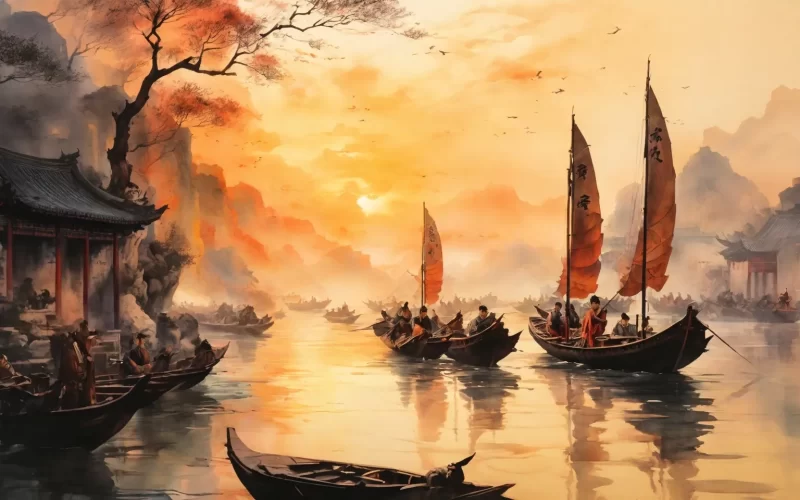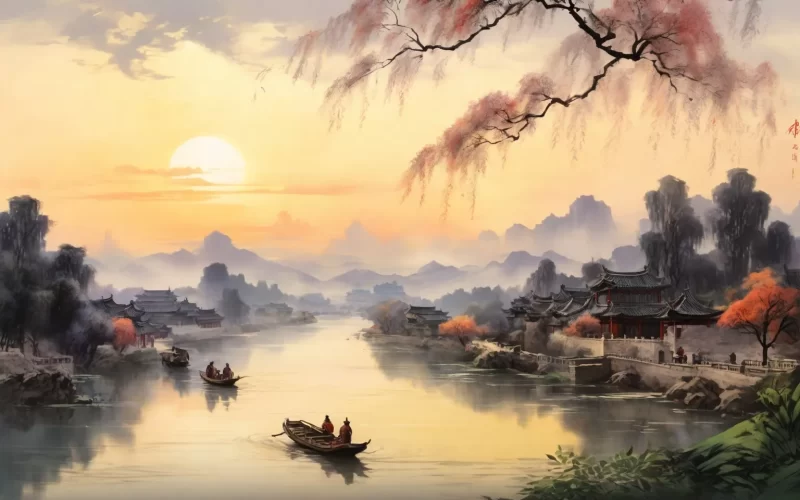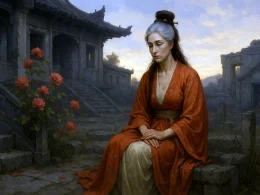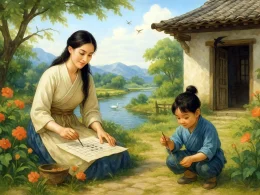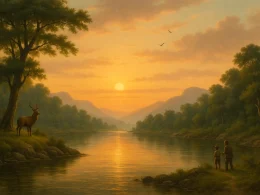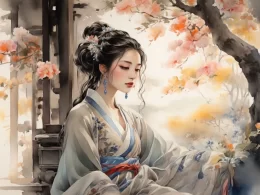The war-chariots rattle,
The war-horses whinny.
Each man of you has a bow and a quiver at his belt.
Father, mother, son, wife, stare at you going,
Till dust shall have buried the bridge beyond Changan.
They run with you, crying, they tug at your sleeves,
And the sound of their sorrow goes up to the clouds;
And every time a bystander asks you a question,
You can only say to him that you have to go.
...We remember others at fifteen sent north to guard the river
And at forty sent west to cultivate the campfarms.
The mayor wound their turbans for them when they started out.
With their turbaned hair white now, they are still at the border,
At the border where the blood of men spills like the sea --
And still the heart of Emperor Wu is beating for war.
...Do you know that, east of China's mountains, in two hundred districts
And in thousands of villages, nothing grows but weeds,
And though strong women have bent to the ploughing,
East and west the furrows all are broken down?
...Men of China are able to face the stiffest battle,
But their officers drive them like chickens and dogs.
Whatever is asked of them,
Dare they complain?
For example, this winter
Held west of the gate,
Challenged for taxes,
How could they pay?
...We have learned that to have a son is bad luck-
It is very much better to have a daughter
Who can marry and live in the house of a neighbour,
While under the sod we bury our boys.
...Go to the Blue Sea, look along the shore
At all the old white bones forsaken --
New ghosts are wailing there now with the old,
Loudest in the dark sky of a stormy day.
Original Poem:
「兵车行」
杜甫
车辚辚,马萧萧, 行人弓箭各在腰。
耶娘妻子走相送, 尘埃不见咸阳桥。
牵衣顿足拦道哭, 哭声直上干云霄。
道旁过者问行人, 行人但云点行频。
或从十五北防河, 便至四十西营田。
去时里正与裹头, 归来头白还戍边。
边亭流血成海水, 武皇开边意未已。
君不闻, 汉家山东二百州,
千村万落生荆杞?
纵有健妇把锄犁, 禾生陇亩无东西。
况复秦兵耐苦战, 被驱不异犬与鸡。
长者虽有问, 役夫敢申恨;
且如今年冬, 未休关西卒。
县官急索租, 租税从何出?
信知生男恶, 反是生女好;
生女犹得嫁比邻, 生男埋没随百草。
君不见,青海头, 古来白骨无人收?
新鬼烦冤旧鬼哭, 天阴雨湿声啾啾。
Interpretation:
"A song of war-chariots" was written by Du Fu in the tenth year of Tianbao (751) during the reign of Emperor Xuanzong of Tang. At this time, the Tang Dynasty was frequently engaged in wars due to its expansionist policies, leading to relentless battles with the Tibetan Empire, the Khitans, and other frontier powers. The ceaseless warfare inflicted great suffering upon the common people. Du Fu, witnessing the harrowing scenes of conscription and farewell, wrote this poem to lament the misery that war brought to the people.
First Couplet:
“车辚辚,马萧萧,行人弓箭各在腰。”
The war carts rumble forward, and the warhorses whimper lowly; each soldier carries a bow and arrows, ready for battle.
“耶娘妻子走相送,尘埃不见咸阳桥。”
Fathers, mothers, wives, and children rush to bid them farewell; the swirling dust rises so thickly that the Xianyang Bridge is no longer visible.
“牵衣顿足拦道哭,哭声直上干云霄。”
Their loved ones clutch at their sleeves, stamp their feet, and block the road, wailing in despair. Their cries rise straight to the heavens.
This couplet vividly portrays the heart-wrenching scene of soldiers departing for war. The roaring carts and sorrowful horses set the somber tone, while the soldiers, armed and ready, have no choice but to march forward. The grief-stricken families desperately try to hold them back, their sorrow piercing the sky. Du Fu’s use of four consecutive action verbs—"牵衣" (clutching at clothes), "顿足" (stamping feet), "拦道" (blocking the road), and "哭" (weeping)—intensifies the emotional impact, making the pain of separation palpable.
Second Couplet:
“道旁过者问行人,行人但云点行频。”
Passersby on the roadside ask the soldiers why they are leaving, but the soldiers merely sigh, lamenting the frequent conscriptions.
“或从十五北防河,便至四十西营田。”
Some were conscripted at fifteen to guard the northern front by the Yellow River, only to find themselves still serving at forty, sent west to farm military lands.
“去时里正与裹头,归来头白还戍边。”
When they first left, the village elder helped wrap their headscarves; now, returning with white hair, they are sent to the frontier once more.
“边亭流血成海水,武皇开边意未已。”
The blood spilled at the border has turned into a sea, yet the Emperor’s desire to expand the frontier has not ceased.
“君不闻,汉家山东二百州,千村万落生荆杞?”
Have you not heard? In the two hundred prefectures of Shandong under the Han dynasty, thousands of villages have fallen into desolation, overgrown with wild brambles.
“纵有健妇把锄犁,禾生陇亩无东西。”
Even strong women plowing the fields and tilling the land cannot make the crops grow properly—the harvest is lost.
“况复秦兵耐苦战,被驱不异犬与鸡。”
Even more tragic, the soldiers of Qin, known for their endurance in war, are driven into battle like mere chickens and dogs, with no regard for their lives.
This couplet reveals the devastating toll of endless warfare. The soldiers’ lives are consumed by the battlefield, from their youth to their old age, as they remain trapped in a cycle of conscription. The emperor’s relentless ambition turns the frontier into a sea of blood, while the homeland, once flourishing, is now barren and abandoned. The final lines compare soldiers to livestock, highlighting their utter helplessness under the control of the ruling class. This sharp contrast between imperial conquest and civilian suffering amplifies the poem’s anti-war message.
Third Couplet:
“长者虽有问,役夫敢申恨?”
Even if the elders inquire, how dare the conscripted soldiers voice their grievances?
“且如今年冬,未休关西卒。”
This winter, just like before, the call for soldiers in the western regions has not ceased.
“县官急索租,租税从何出?”
The local officials press the people for taxes, but with barren fields, where can the tax grain come from?
“信知生男恶,反是生女好。”
Now people truly understand: having a son is a misfortune, while having a daughter is a blessing.
“生女犹得嫁比邻,生男埋没随百草。”
A daughter can still marry a neighbor and live, but a son will be buried in the fields, lost among the wild grass.
“君不见,青海头,古来白骨无人收?”
Have you not seen, by the shores of Qinghai, where the bones of the fallen have lain for generations, never to be gathered?
“新鬼烦冤旧鬼哭,天阴雨湿声啾啾。”
New ghosts wail in grievance, while the old ghosts weep in sorrow; under the dreary sky, their cries mingle with the sound of the cold, unceasing rain.
This final couplet brings the poem to its emotional climax. The soldiers, unable to voice their suffering, are endlessly drafted into war, while their families face starvation under crushing taxation. The once-prized birth of a son has become a curse, as he is destined for a battlefield grave. The concluding imagery of unclaimed bones and weeping ghosts solidifies the poem’s haunting condemnation of war, evoking an eerie, mournful atmosphere that lingers in the reader’s mind.
Overall Analysis
"Bing Che Xing" is a deeply sorrowful anti-war poem, structured in a progressively intensifying manner. It begins with the sorrow of departure, moves through the soldiers’ grievances and the ruin of the countryside, and ultimately ends with a chilling scene of unburied bones and mourning spirits. Du Fu employs a realist approach, vividly portraying the suffering caused by war. The poem’s relentless accumulation of grief and despair leaves an indelible impact on the reader, making it one of the most powerful critiques of war in classical Chinese poetry.
Writing Techniques
- Varied Sentence Structures for Impact
The poem seamlessly transitions between three-character, five-character, seven-character, and ten-character lines, creating a dynamic rhythm that enhances emotional expression. - Juxtaposition to Heighten Irony
The reversal of traditional gender roles—"生男恶,生女好"—powerfully illustrates how war has distorted societal values, sharpening the poem’s satirical edge. - Progressive Development for Emotional Depth
The poem moves from personal sorrow to national calamity, culminating in a supernatural lament, deepening its thematic impact and reinforcing its anti-war stance.
Insights
"Bing Che Xing" is not only Du Fu’s condemnation of Emperor Xuanzong’s aggressive military campaigns but also a timeless reflection on the horrors of war. It reveals that war does not only spill blood on the battlefield but also devastates homes, destroys families, and leaves nations in ruin. The poet’s deep compassion for the suffering of ordinary people is evident throughout the poem, urging readers to reflect on the true cost of war. Even after more than a thousand years, its message remains profoundly relevant, reminding future generations of the irreplaceable value of peace.
Poem translator:
Kiang Kanghu
About the poet
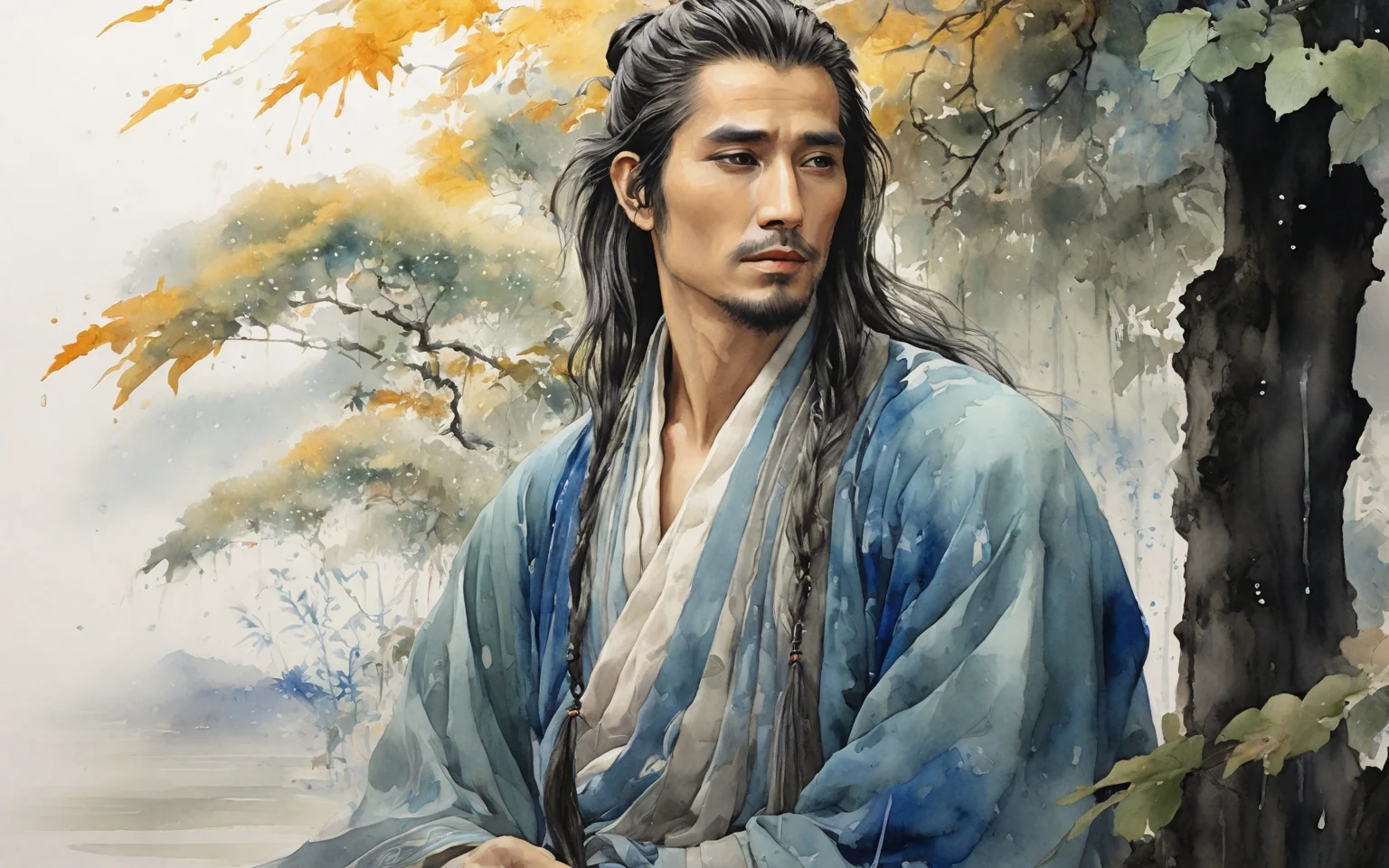
Du Fu (杜甫), 712 - 770 AD, was a great poet of the Tang Dynasty, known as the "Sage of Poetry". Born into a declining bureaucratic family, Du Fu had a rough life, and his turbulent and dislocated life made him keenly aware of the plight of the masses. Therefore, his poems were always closely related to the current affairs, reflecting the social life of that era in a more comprehensive way, with profound thoughts and a broad realm. In his poetic art, he was able to combine many styles, forming a unique style of "profound and thick", and becoming a great realist poet in the history of China.







